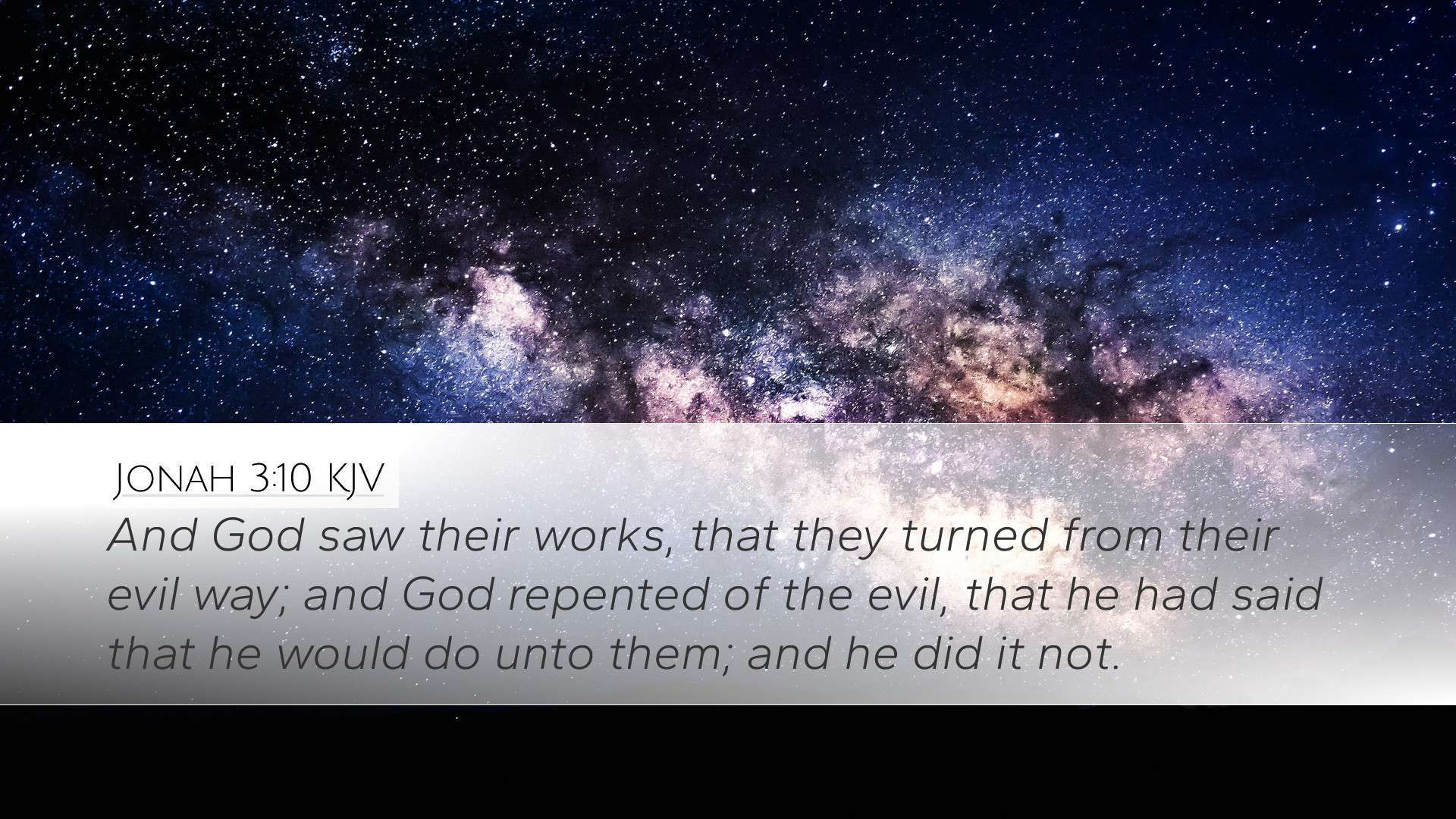Old Testament
Genesis Exodus Leviticus Numbers Deuteronomy Joshua Judges Ruth 1 Samuel 2 Samuel 1 Kings 2 Kings 1 Chronicles 2 Chronicles Ezra Nehemiah Esther Job Psalms Proverbs Ecclesiastes Song of Solomon Isaiah Jeremiah Lamentations Ezekiel Daniel Hosea Joel Amos Obadiah Jonah Micah Nahum Habakkuk Zephaniah Haggai Zechariah MalachiJonah 3:10
Jonah 3:10 KJV
And God saw their works, that they turned from their evil way; and God repented of the evil, that he had said that he would do unto them; and he did it not.
Jonah 3:10 Bible Commentary
Commentary on Jonah 3:10
Text of Jonah 3:10: "And God saw their works, that they turned from their evil way; and God repented of the evil, that he had said that he would do unto them; and he did it not."
Introduction
The verse captures a pivotal moment in the Book of Jonah, where the mercy of God is highlighted in response to human repentance. This commentary seeks to delve into the theological implications and interpretations presented by notable biblical scholars such as Matthew Henry, Albert Barnes, and Adam Clarke. The insights provided are invaluable for pastors, students, theologians, and scholars alike.
The Context of Jonah 3:10
Jonah, a prophet of God, was sent to Nineveh, a city known for its wickedness. Following Jonah’s reluctant compliance and subsequent preaching, the people of Nineveh repented from their evil ways. This repentance prompted a divine response which is vividly captured in Jonah 3:10. Understanding the social, historical, and spiritual context is essential for a deeper comprehension of this verse.
God's Observation of Human Behavior
Henry notes that God's "saw their works" indicates not merely an observation but an assessment of their genuine repentance. This emphasizes the theological principle that true repentance manifestly changes one's actions and leads to divine forgiveness.
The Turning from Evil
Albert Barnes explains that this phrase indicates a significant transformation. The Ninevites’ actions were outward expressions of their inward conviction. This transformation exemplifies the authentic nature of repentance as both a decision and a lifestyle change. The depth of their repentance reflects the seriousness with which they regarded their sinful state.
God's Repentance
One of the most debated phrases in this verse is “God repented.” Adam Clarke elucidates this by explaining that "repentance" here is not to be understood in the human sense of regret or confusion, but rather represents God's readiness to change His course of action in light of human repentance. It highlights God's sovereign control and His relational nature with humanity.
Theological Insights
The Nature of God’s Mercy
This incident profoundly illustrates God’s mercy. Henry emphasizes that God is merciful and full of compassion; His replies to human actions often reflect His desire for reconciliation rather than retribution. His willingness to relent shows His readiness to forgive when there is true repentance.
The Relationship Between Judgment and Repentance
Barnes draws attention to the balance between divine judgment and human response. The verse portrays a dynamic interaction where human actions can influence God's decisions. This reinforces the idea of God inviting His people to engage deeply with Him through genuine contrition and faith.
The Implications for Israel and the Church
Clarke asserts that the lessons from Nineveh extend beyond them to Israel and the contemporary church. Just as the Ninevites received God's mercy, so too can nations today, provided they turn from evil. It challenges the people of God to live authentically and call others to repentance with the same urgency that Jonah did.
Practical Applications
Encouragement for Repentance
This verse serves as a clarion call to all individuals and communities about the power of repentance. Henry encourages believers to respond to God’s call, fostering a routine of self-examination and genuine turning away from sin.
Understanding Divine Grace
Barnes suggests that the mercy shown to Nineveh should continually inspire hope in believers today. It reinforces the profound theological truth that no sin is too great for God’s forgiveness, asserting that His grace is sufficient to cover even the most egregious offenses.
Encouragement for Evangelism
Clarke highlights the result of Jonah’s preaching and its impact on the Ninevites. The active engagement through evangelism and proclamation of the gospel bears fruit when met with an open heart. This encourages the church today to persist in declaring the gospel, as God honors those efforts positively.
Conclusion
Jonah 3:10 serves as a profound reminder of God’s character and His interactions with humanity. Through the insights of Matthew Henry, Albert Barnes, and Adam Clarke, we gain valuable understanding regarding repentance, divine mercy, and the transformative power of God's grace. For pastors, students, theologians, and biblical scholars, this commentary invites deeper reflection and encourages active engagement in the life of faith and witness to a world in need of God’s redeeming love.


